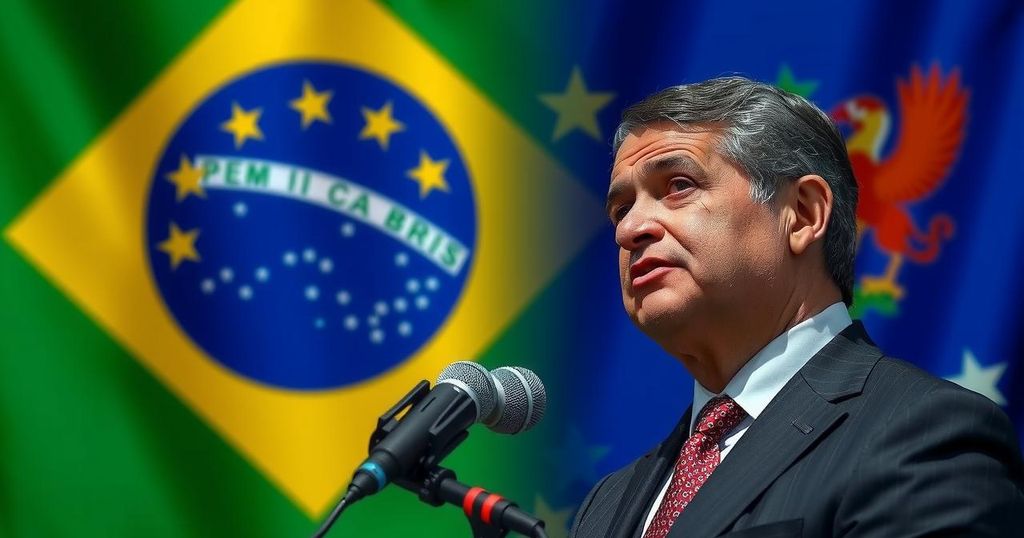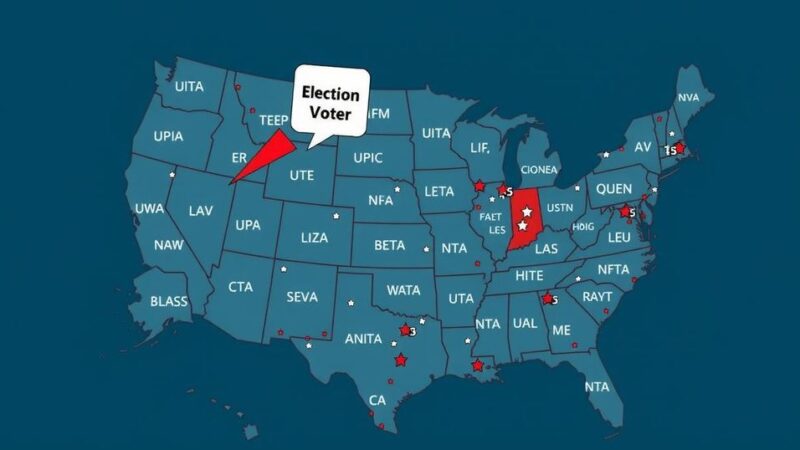Venezuelan President Nicolás Maduro accused Brazilian diplomat Eduardo Paes Saboia of vetoing Venezuela’s admission to BRICS, contradicting prior assurances from Brazil’s Foreign Minister Mauro Viera. This incident exacerbates existing diplomatic tensions between Venezuela and Brazil amid disputes over Venezuela’s elections and the impact of U.S. sanctions on Venezuela’s economy.
Venezuelan President Nicolás Maduro has attributed Venezuela’s exclusion from the recent XVI BRICS Summit to the actions of a Brazilian diplomat who contradicted previous assurances regarding Venezuela’s admission. While attending the summit in Kazan, Russia, Maduro asserted that Brazilian Foreign Minister Mauro Viera had clearly stated on several occasions that Brazil would not veto Venezuela’s entry into the BRICS bloc. However, the president stated that Brazilian diplomat Eduardo Paes Saboia executed the veto at the last moment, leading to what Maduro termed a “stab in the back.” He criticized Paes as a “fascist” and a supporter of former Brazilian President Jair Bolsonaro, suggesting that the Brazilian foreign service, Itamaraty, has historically maintained a close relationship with U.S. interests. The news of Venezuela’s exclusion came unexpectedly, heightening tensions between Caracas and Brasilia amid ongoing disputes related to Venezuela’s recent presidential elections. Brazilian President Luiz Inácio Lula da Silva, who did not attend the summit, had expressed concerns about the lack of detailed election results after Maduro was declared the victor. Lula has indicated that there may be repercussions for the bilateral relationship with Venezuela, although he stopped short of outright refusal to engage with Maduro’s government. This exclusion is particularly poignant for Venezuela, given its long-standing efforts to join BRICS, which Maduro views as a potential means of gaining economic support amid crippling U.S. sanctions. The president emphasized the need for BRICS to create a new international financing system free from Western dominance, especially as these sanctions have severely impacted Venezuela’s oil trade. During the summit, Maduro called attention to the New Development Bank’s role in offering alternative financing solutions, a crucial need for his administration. The BRICS bloc recently expanded, granting membership to numerous countries while continuing to ignore Venezuela’s aspirations to join.
The BRICS bloc, consisting of Brazil, Russia, India, China, and South Africa as original members and recent additions including Egypt and the United Arab Emirates, aims to promote a multipolar world free from Western hegemony. Venezuela, under President Maduro, has been keenly pursuing membership in BRICS as a response to longstanding economic sanctions imposed by the United States, which have significantly crippled its economy, particularly its oil industry. This backdrop of geopolitical maneuvering highlights the importance of Venezuela’s desired entry into BRICS and the associated diplomatic tensions with Brazil, especially in light of the recent election disputes in Venezuela.
In summary, Maduro’s displeasure with the diplomatic dealings surrounding Venezuela’s anticipated entry into BRICS hinges on allegations of betrayal by a Brazilian diplomat. The failed bid reflects broader issues of geopolitical alignment and tension between Caracas and Brasília, particularly related to the U.S. sanctions impacting Venezuela’s economy. The situation underscores the complexities involved in international diplomacy, especially for nations like Venezuela seeking allies within influential global coalitions.
Original Source: venezuelanalysis.com






